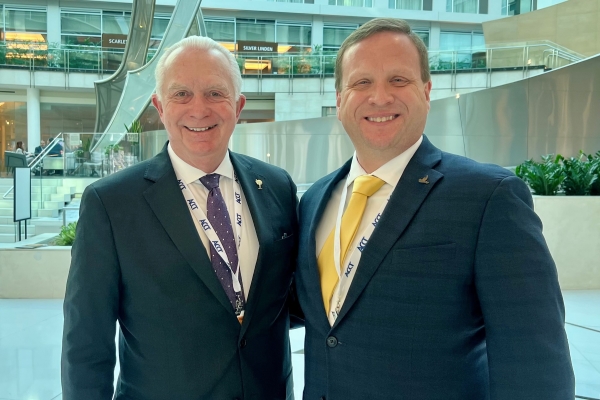
Dr. Keith Miller has recently been honored as the first-ever President Emeritus by Black Hawk College, where he served as president from July 2000 to June 2008 before filling that role at Greenville Technical College. This prestigious title acknowledges his outstanding service and dedication.
With a remarkable 34-year career in higher education, Dr. Miller has held various roles including faculty member, dean, vice president, and president. Before his impactful tenure at Black Hawk College, he was the president of Spoon River College in Canton, IL.
“I am deeply honored to be named the first President Emeritus of Black Hawk College,” Miller said. “I will forever be grateful to the Black Hawk community for their genuine warmth and unwavering support.”
Dr. Miller came to Greenville Technical College (GTC) as its second president in 2008 and will continue to lead until his planned retirement in July 2025.
He began his own college education at a community college, earning an associate degree in technical education – radiologic technology before adding a bachelor’s degree, a master’s degree, and finally, a doctorate degree in adult and continuing education. This experience as a two-year college student has informed his interest in helping students navigate unfamiliar territory.
Under his leadership, students are supported from day one to graduation and every student has an equal opportunity for success. Innovative efforts include the African American Male Scholars Initiative, a Collegiate Recovery Program, and a Student Assistance and Resources Center where those facing the obstacles of hunger and emergency financial barriers can find relief. The result is an inclusive environment where each employee and every student can find a sense of belonging, earning GTC the Higher Education Excellence in Diversity award seven times, most recently in 2023.
Much of what Miller has accomplished at the college has been the result of productive partnerships. He has worked closely with employers to create innovative solutions to workforce needs. Examples include the Center for Manufacturing Innovation, which is training and educating mechatronics technicians, machinists, and electronic technicians for advanced manufacturing. When employers in that sector asked for an educational step beyond the associate degree to create candidates for technical and managerial leadership positions, Miller gained support from legislators for an applied bachelor’s degree in advanced manufacturing technology at the technical college level. GTC is now the only two-year college in the state pioneering that curriculum.
When Prisma Health sought a new avenue for creating well-qualified professionals to enter the healthcare field, Miller worked with the hospital system to bring the Prisma Health Center for Health & Life Sciences to reality. Opening this fall, the largest building on the college’s Barton Campus will allow students to pursue careers in healthcare and complete general education requirements. This facility will impact 90 percent of GTC students and serve all of the 500-600 health science graduates that the college contributes to the local workforce each year.
Similarly, the Truist Culinary and Hospitality Innovation Center is an answer to employer needs. When the hospitality industry needed to expand its pipeline of skilled employees, Miller matched that need with those of an underserved area in West Greenville, creating a change agent that provides a clear path to upward mobility as it increases the number of qualified hospitality employees.
The Center for Welding and Automation Excellence, expected to open in 2026, will help to solve the welding challenge in workforce development. The 44,000-square-foot facility will offer enhanced technology including artificial intelligence, expanded and inviting teaching and learning spaces, and increased welding stations.